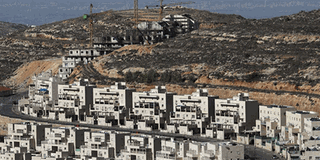Israelis celebrate, Palestinians rail against US settlement move

Israeli settlement of Givat Zeev near the Palestinian city of Ramallah in the occupied West Bank on November 19, 2019. PHOTO | AHMAD GHARABLI | AFP
What you need to know:
- US announced that it no longer considers settlements in the West Bank and annexed east Jerusalem illegal.
- Israeli Prime Minister Benjamin Netanyahu on Tuesday hailed the US announcement.
- The Palestinian Authority, which considers the US biased, denounced the latest decision.
- More than 600,000 Israelis live in settlements in east Jerusalem and the West Bank, alongside more than three million Palestinians.
Jerusalem
Israeli Prime Minister Benjamin Netanyahu on Tuesday hailed a US announcement that it no longer considers settlements in the West Bank and annexed east Jerusalem illegal, but the Palestinians pledged new measures to oppose it.
Netanyahu visited the Gush Etzion settlement bloc south of Jerusalem, where he told settler leaders he was "very moved" by the announcement made by US Secretary of State Mike Pompeo on Monday.
"Here we are on a historic day with another tremendous achievement for the State of Israel, which we have greatly worked for," he told them, according to a statement released by his spokesman.
HISTORIC INJUSTICE
"The Trump administration has corrected an historic injustice and lined up with truth and justice."
Pompeo said that after legal consultation Washington had concluded the establishment of settlements was "not, per se, inconsistent with international law".
He said that the United States was not necessarily considering the settlements legal either, but instead would defer to the judgement of Israeli courts. The majority of settlers live in settlements the courts have judged legal.
The decision is the latest in a series of pro-Israeli moves by Donald Trump's administration, including recognising the disputed city of Jerusalem as Israel's capital and recognising Israeli sovereignty over the Golan Heights, seized from Syria in the Six-Day War of 1967.
US ON ITS OWN
It puts the United States at odds with virtually the whole of the rest of the international community and breaks with UN Security Council resolutions declaring the settlements to be illegal as they are built on occupied land.
More than 600,000 Israelis live in settlements in east Jerusalem and the West Bank, alongside more than three million Palestinians.
CRITICISM
The Arab League criticised Pompeo's announcement, calling it an "extremely adverse development."
The only two Arab states to have signed peace treaties with Israel -- Egypt and Jordan -- also sharply criticised the US policy shift, with Jordanian Foreign Minister Ayman Safadi warning of its "dangerous consequences".
The European Union reiterated that it considers all settlement activity "illegal under international law."
The direct impact on the ground may be limited but analysts say it will further embolden the settlement movement and may fend off potential legal moves against Israel.
The Palestinian Authority -- which considers the US biased and has rejected the Trump administration as a mediator if peace talks are ever revived -- denounced the latest decision.
OPPOSITION
Chief negotiator Saeb Erekat said the Palestinians would take a series of measures to oppose it.
"We began deliberations in the UN to present a draft resolution in the Security Council," he said Tuesday.
"We expect a (US) veto but we will do it. Let the United States veto international law.
"We are going to the (UN) General Assembly and we will ask... the International Criminal Court to open an official judicial investigation with Israeli officials concerning settlements."
The US change of policy was widely seen as an attempt to change the legal context for a series of suits and complaints against Israel.
The European Union's top court last week ruled that EU countries must identify products made in Israeli settlements on their labels.
The International Criminal Court is expected to take key decisions on two cases against Israel in the coming weeks, including on Israeli settlements.





